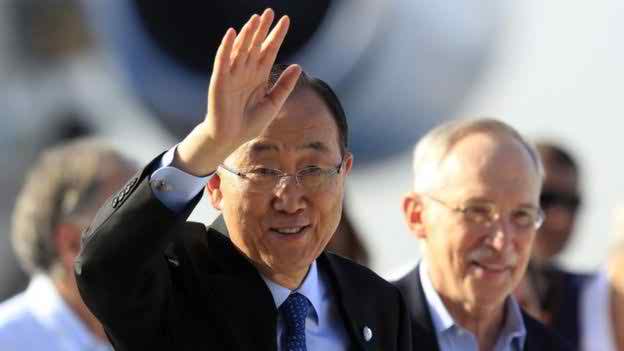Hillary Clinton says presidential rival Donald Trump appears to have violated US laws, after a report said he broke a trade embargo with Cuba.
Newsweek reports that Mr Trump's company secretly conducted business in Cuba, violating the US trade embargo against the country.
The company allegedly spent at least $68,000 (£52,300) in Cuba in 1998.
Mr Trump's spokesman Kellyanne Conway said the money was not paid, and that he was against deals with Cuba.
Mr Trump has also repeatedly said he had rejected offers to invest in Cuba.
The Newsweek report says Mr Trump's company funnelled the cash through a US consulting firm to make it appear legal.
Mrs Clinton said: "We have laws in our country, and the efforts that Trump was making to get into the Cuban market - putting his business interests ahead of the laws of the United States and the requirements that businesses were operating under with sanctions shows that he puts his personal and business interests ahead of the laws and values and the policies of the United States of America."
"This is something they're going to have to give a response to," said Marco Rubio, the Cuban-American senator from Florida who has endorsed Mr Trump. "I mean, it was a violation of American law, if that's how it happened.
"I hope the Trump campaign is going to come forward and answer some questions about this, because if what the article says is true - and I'm not saying that it is, we don't know with 100% certainty - I'd be deeply concerned about it," he told a podcast hosted by ESPN and ABC.
Analysis: Anthony Zurcher, BBC News North America reporter
Don't run afoul of Florida's expatriate Cuban community. It's one of those iron-clad rules that Republican presidential nominees have obeyed since the rise of Fidel Castro - and it's now another rule that Donald Trump has apparently broken.
Cuban-Americans who fled the island after the revolution historically have been a reliable voting bloc in Florida for Republicans because of the party's hard-line anti-communist stance. While new generations of Cuban-Americans have been less rigid on the issue, Republican presidential candidates continue to pay deference to their interests in this presidential swing state, where every vote is precious.
Earlier this week, the Republican nominee was making nice with Cuban-Americans in Miami's Little Havana and ordering coffee at the famous Versailles Restaurant - much like his predecessors had before him. His efforts, however, may be undone by his past actions.
What the report says
Newsweek's front-page - citing company records, interviews with former Trump executives and court filings - alleges that Mr Trump's company, then called Trump Hotels & Casino Resorts, sent a consulting firm to Havana on its behalf in search of business opportunities.
Newsweek says Mr Trump's senior officers disguised the cash by making it appear that the trip was connected to a Catholic charity.
If the consulting firm spent US money during the visit, without permission from the US government, it would have directly violated the Cuban embargo, which remains in place to this day despite a warming in US-Cuba ties.
What the Trump campaign has said
Speaking on ABC earlier on Thursday, Ms Conway initially said: "As I understand from the story, they paid money in 1998." Later in the same interview, she said: "Did his hotel invest in 1998 in Cuba? No."
There has been no further statement from the Trump campaign.
Ms Conway referred to comments Mr Trump has made in the past that were critical of the Cuban regime, and supportive of the embargo.
In a 1999 column in The Miami Herald, Mr Trump wrote that he had snubbed chances to do business in Cuba. "It would place me directly at odds with the longstanding US policy of isolating Fidel Castro. I had a choice to make: huge profits or human rights. For me, it was a no-brainer.
A history of the US trade embargo with Cuba
1959: Cuban revolutionary Fidel Castro leads a guerrilla army into Havana overthrowing the Batista regime.
1960: In response to Castro's communist reforms, US breaks off diplomatic relations with Cuba and imposes a trade embargo.
1962: Castro agrees to allow the Soviet Union to deploy nuclear missiles on the island bringing the US and the USSR to the brink of nuclear war.
April 2009: President Barack Obama lifts restrictions on family travel and the sending of remittances to Cuba.
July 2015: The US and Cuba reopen embassies in each other's capitals and restore full diplomatic ties.
March 2016: President Obama makes a three-day visit to Cuba and holds talks with President Raul Castro. He expresses hope the embargo will be ended, but it can only be lifted by the US Congress which is controlled by Republicans who oppose the move.
Aug 2016: US commercial flight arrives in Cuba for the first time in more than half a century.































